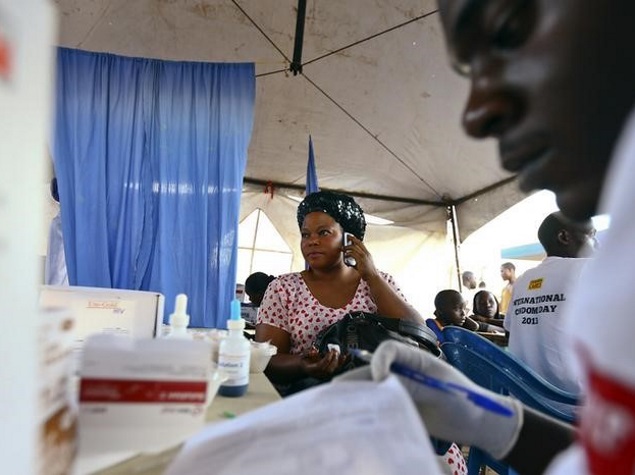- Home
- Mobiles
- Mobiles News
- Mobiles 'Game Changers' in Securing Children's Rights: Unicef
Mobiles 'Game Changers' in Securing Children's Rights: Unicef

Unicef's flagship annual report State of the World's Children showcases cutting-edge innovations for children, from urine-powered generators to mobile phone-generated birth certificates, and invites readers to share their own ideas.
"There are innovative minds and people all over the world that are coming up with solutions that can be game changers in terms of helping children to stay alive and realise their full potential," Jaya Murthy, Unicef's Uganda spokesman, told the Thomson Reuters Foundation.
"We need to be as open-minded as possible to continue to be on the cutting edge of new technological developments so that we can capitalise on them to accelerate the progress for children."
Uganda is emerging as a leader in using information and communication technologies, particularly mobile phones, to share information in real time.
Some 27,000 government health workers use a mobile health system called mTRAC to report on medicine stocks across the country.
"It's had a transformative impact in terms of addressing disease and ensuring that health centres are well stocked," said Murphy. "They (the ministry of health) get that information in real time and they are able to take action immediately."
With the use of mTRAC, the number of clinics that ran out of key medicines dropped to 15 from 60 percent between 2011 and 2014, he said.
Uganda has also adopted a mobile phone birth registration system, and the mobile registration of newborns rose to 54 percent of the total from 30 percent in three years, Unicef said. Between 2006 to 2011, it only went up nine percent.
Without a birth certificate children do not legally exist, and they often cannot use vital services like education, or prove their age, for example, to protect them from early marriage.
Doctors or registrars operating in Uganda's 135 national hospitals now issue birth certificates on the spot.
"You enter all the information online, either through the phone or on a computer, and then immediately you can print out a birth certificate and give it to that baby," said Murphy.
Another Ugandan innovation is U-report, a mobile phone-based tool for polling citizens on social development issues. Some 270,000 Ugandans have registered with the system and sent over 3.5 million SMS, Murphy said.
Poll results are used in the Ugandan media and shared with parliamentarians.
U-Report is now being rolled out in Liberia to gauge how Ebola is affecting young people's lives.
"We are seeing them (innovations) being picked up by other countries because of the potential they offer to really significantly move the needle in terms of improving access to vital services," said Murphy.
© Thomson Reuters 2014
Get your daily dose of tech news, reviews, and insights, in under 80 characters on Gadgets 360 Turbo. Connect with fellow tech lovers on our Forum. Follow us on X, Facebook, WhatsApp, Threads and Google News for instant updates. Catch all the action on our YouTube channel.
Related Stories
- Samsung Galaxy Unpacked 2026
- iPhone 17 Pro Max
- ChatGPT
- iOS 26
- Laptop Under 50000
- Smartwatch Under 10000
- Apple Vision Pro
- Oneplus 12
- OnePlus Nord CE 3 Lite 5G
- iPhone 13
- Xiaomi 14 Pro
- Oppo Find N3
- Tecno Spark Go (2023)
- Realme V30
- Best Phones Under 25000
- Samsung Galaxy S24 Series
- Cryptocurrency
- iQoo 12
- Samsung Galaxy S24 Ultra
- Giottus
- Samsung Galaxy Z Flip 5
- Apple 'Scary Fast'
- Housefull 5
- GoPro Hero 12 Black Review
- Invincible Season 2
- JioGlass
- HD Ready TV
- Latest Mobile Phones
- Compare Phones
- Tecno Pova Curve 2 5G
- Lava Yuva Star 3
- Honor X6d
- OPPO K14x 5G
- Samsung Galaxy F70e 5G
- iQOO 15 Ultra
- OPPO A6v 5G
- OPPO A6i+ 5G
- Asus Vivobook 16 (M1605NAQ)
- Asus Vivobook 15 (2026)
- Brave Ark 2-in-1
- Black Shark Gaming Tablet
- boAt Chrome Iris
- HMD Watch P1
- Haier H5E Series
- Acerpure Nitro Z Series 100-inch QLED TV
- Asus ROG Ally
- Nintendo Switch Lite
- Haier 1.6 Ton 5 Star Inverter Split AC (HSU19G-MZAID5BN-INV)
- Haier 1.6 Ton 5 Star Inverter Split AC (HSU19G-MZAIM5BN-INV)







![[Partner Content] OPPO Reno15 Series: AI Portrait Camera, Popout and First Compact Reno](https://www.gadgets360.com/static/mobile/images/spacer.png)









